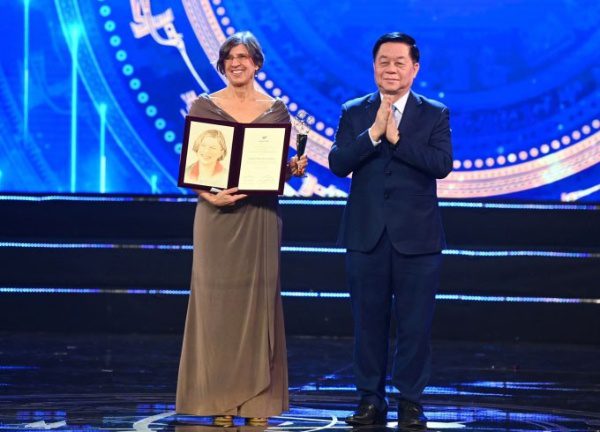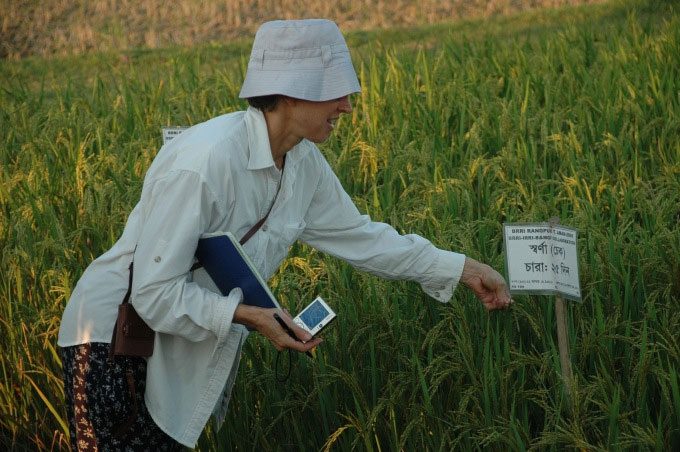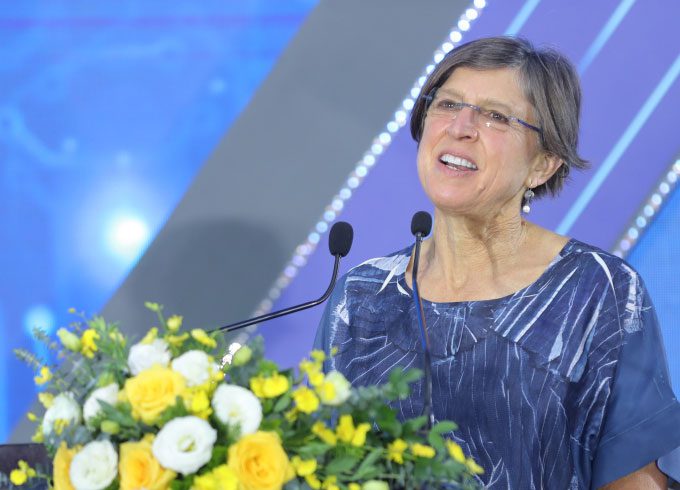Professor Pamela C. Ronald recently received a special award from VinFuture 2022 for her research on isolating specific rice genes to develop high-yield, flood-resistant rice varieties.
During the awards ceremony on the evening of December 20 in Hanoi, Professor Pamela C. Ronald (61 years old) expressed her emotions as the VinFuture Global Science and Technology Award Council announced her name in the “Special Award for Female Scientists” category, which comes with a prize of $500,000.
Professor Ronald’s work pioneers the isolation of the Sub1A rice gene to develop superior flood-resistant, high-yield rice varieties. This groundbreaking discovery in rice genetics is suitable for cultivation conditions in Laos, Bangladesh, and India, with potential applications in other countries as well. In Vietnam, many locals are growing the Khang Dan rice variety, bred from Sub1, in Hai Duong and several provinces in the Central Highlands.

Professor Pamela C. Ronald (left) at the awards ceremony on December 20 in Hanoi. (Photo: Giang Huy)
Ronald leveraged fundamental discoveries about the Sub1 rice gene related to immune response regulation in flooded conditions, leading to the creation of genetically modified rice varieties with outstanding flood tolerance, providing immense benefits globally.
She recounted that in 1996, David Mackill from the International Rice Research Institute (IRRI) discovered a flood-tolerant gene in an Indian rice variety that could withstand flooding for up to two weeks but had low yield. Demonstrating the importance of the Sub1 locus for complete flood tolerance, Mackill shared this information with Ronald. “Two of my colleagues attempted to isolate this gene to incorporate it into existing rice varieties. Ultimately, we succeeded,” she stated.
Professor Ronald successfully replicated the Sub1 gene region that encodes three transcription factor regulators essential for plant immune response to stress (extreme conditions), specifically the ethylene-responsive factor (ERF). She also confirmed that one of these three factors, Sub1A (Submergence Tolerance Regulator), produces mutations in response to flooding, enabling the creation of genetically modified crops capable of enduring prolonged submergence. This significant discovery has led to the development of high-yield flood-resistant rice varieties.
In the journal Rice, she and Mackill published new “Sub1” super rice varieties that provide effective flood tolerance without negatively affecting growth, yield, or rice grain quality.
These new flood-resistant rice varieties from Ronald have offered long-term, systematic solutions to nutritional issues faced by many countries. An estimated 4 million tons of rice are lost annually due to flooding, which is enough to feed 30 million people. Developing crop varieties, particularly rice that can withstand environmental pressures alongside climate change, will benefit both farmers and consumers.
“Breeders at IRRI and in Vietnam have incorporated this trait into various rice varieties, perhaps around 10 to even 12 hectares, and the planting area continues to grow,” Ronald shared during a meeting with Vietnamese journalists on December 14.
“Crops Can Communicate with Each Other”
With over 35 years of research experience, Ronald has become a strong advocate for sustainable science and agriculture. Her laboratory serves as a nurturing ground for developing rice varieties resistant to diseases and capable of surviving harsh conditions like drought, flooding, and salinity. Nevertheless, she admits that she did not have a meticulously planned approach; instead, she simply pursued what excited her.
Her father was a refugee and the first generation in her family to move to the United States. Growing up, she was drawn to Bangladesh, a country that at the time faced severe challenges of poverty and widespread malnutrition. “I wanted to work in areas where I could help countries like Bangladesh.”
Initially studying Biology at Reed College, she switched from animal research to working on crops because she was “afraid of blood.” Upon starting her first job in a seed genetics laboratory at Stanford, “which was all women,” she began to truly feel her passion for plant genetics and decided to pursue a career in science.
During a conversation in Hanoi on the morning of December 21, she revealed that when she began studying plant interactions, she found it “interesting to know that they could communicate with each other. I’ve spent most of my career researching crops.”

Professor Pamela C. Ronald examining flood-resistant rice varieties. (Photo: NVCC)
In addition to her success with flood-resistant rice, in 1995, she also identified a critical gene locus for the innate immune response of plants to pathogens (the Xa21 gene that encodes a protein named XA21), which is key to rice’s response to the bacterial pathogen Xanthomonas oryzae pv oryzae (Xoo). This locus is very similar to genes in fruit flies and mice that promote the innate immune response in animals, recognized by the Nobel Prize in Physiology for Bruce Beutler and Jules Hoffmann in 2011. Pamela C. Ronald later identified a protein named RaxX, produced by the pathogenic bacterium Xoo, as the component activating the XA21 protein receptor.
Professor Ronald believes that plant genetics will become an important field of development today, and high-tech agricultural applications are becoming a trend for the future. She adds that more and more young people are turning to agriculture, not in the way their parents did, but by discovering new approaches with innovative ideas to create sustainable and effective farms while constantly seeking business opportunities.
“I’m not quite sure what efforts Vietnam has made, but there’s a notable approach in the U.S.,” she stated, which combines the use of innovative technology, tools, and equipment. Some smaller farms often innovate their marketing strategies for their products. With this combination, she believes they are starting to attract younger individuals.
Ronald also revealed that there is a Vietnamese scientist working in her laboratory. According to Professor Pamela, Vietnam has the advantage of diverse gene sources, with many populations of plants already possessing desirable traits. “The hardest part is screening to obtain the right environment and plant materials,” she said, suggesting that young people could pursue fields like genetics and plant breeding.
She mentioned that she is currently researching genes to optimize those that can control root system expansion, helping plants absorb carbon. “We want to understand how carbon typically enters roots and how it is absorbed underground. The goal is to develop root systems that optimize carbon capture, not just in rice but in many other plants as well,” she said, emphasizing that this is an incredibly exciting time for scientists in her field, and she hopes that young scientists will join her on this path.

Professor Pamela C. Ronald sharing her research journey on December 21 in Hanoi. (Photo: Phuong Linh).
Professor Pamela C. Ronald has been named a National Geographic Fellow, recognized as one of the most influential scientific minds in the world by Thomson Reuters and one of the 100 most influential people in biotechnology by Scientific American magazine. She founded the UC Davis Agricultural and Food Knowledge Institute to support young scientists. In 2020, she was honored with the Global Federation of Animal Science Societies World Agriculture Award. In 2022, Ronald received the Wolf Prize in Agriculture. The book Tomorrow’s Table, which she co-authored, was selected as one of the 25 most powerful and influential books capable of inspiring university readers to change the world.













































